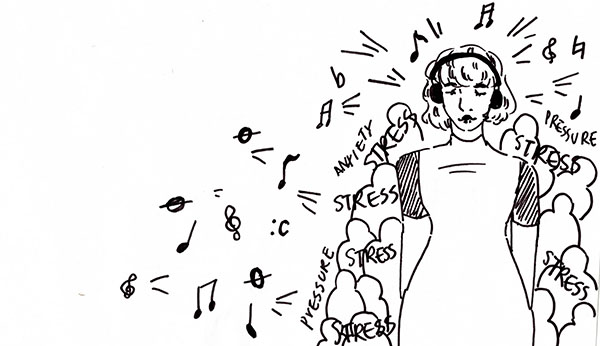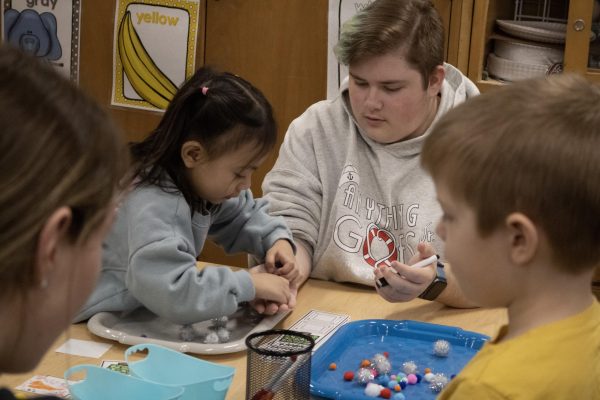Music helps students find harmony during cacophony

Illustration by Esther Lim
December 20, 2019
The piano keys are home to sophomore Veronika Gliwa after a long day of studying that leaves her mind crowded and congested. But Gliwa said that the piano requires so much multitasking and focus that she enters a clear-minded state. Surprisingly, playing the piano was at first a frustrating learning experience, Gliwa said. However, with practice and dedication, she found that her passion could instead be a moment of calm amongst other struggles in her life such as schoolwork.
“Often, whenever I’m too unnerved to begin an essay or study for a test, I go over to my piano and just sit down [and play],” Gliwa said. “Sometimes, even for up to an hour and a half or two hours, I’ll just be playing the piano. It’s a really great way for me to relax.”
Senior Safa Mohammed said music has been a strong force in helping her get through obstacles in her life. When Mohammed was going through a rough breakup that put strains on her mental health, she stated that music kept her company and proved to be a source of comfort.
“When I was going through my breakup, I didn’t know who to turn to because I felt like my friends didn’t understand, but the music definitely understood,” Mohammed said. “I like to be alone and I didn’t want to talk to anyone, but the music was as if someone was there to talk to.”
Mohammed said she turns to Taylor Swift’s music when going through hardship, because Swift makes common struggles of teenage girls seem relatable.
“Old Taylor Swift really spoke to me,” Mohammed said. “The acoustics of her songs tend to calm me down, and the lyrics really capture all the stages of a break up. I feel like she has been such a strong voice for so many common struggles of teenage girls and she makes you feel like whatever you’re going through is normal at this age.”
Deborah Stein, Brain Studies teacher, said the brain is largely to blame for emotional reactions to music. Dopamine, known as the “feel-good” neurotransmitter in the brain, plays a role in triggering sensation from music.
“Music activates the striatum, which is a dopamine producing region [in the brain],” Stein said. “These structures are associated with pleasure and reward and receive more blood flow when listing to music. When people listen to music that they are familiar with and really like, this shows anticipation of pleasure in the striatum.”
Freshman Dana Thurnell believes that music helps her feel calm in moments of stress. Homework is an ongoing source of irritation to Thurnell, but music helps alleviate those feelings.
“[Listening to music] helps me calm down,” Thurnell said. “Sometimes, you just get really frustrated when you’re doing homework, and you can’t solve a math problem, and you just want to throw your computer at the wall. Music helps me contain [my frustration] because I feel inspired by it.”
Thurnell is not alone in using music to destress, as according to an unscientific survey conducted by The Oracle, 57% of the student body finds common ground in turning to music to relieve stress. Stein explained how the brain releases certain hormones according to different types of music, which is why the genre of music often affects a person’s mood.
“Relaxing music can lead to a decrease in cortisol and the sympathetic nervous system in general,” Stein said. “It can also activate the parasympathetic nervous system, which leads to an overall slowing of the body.”
Mohammed concluded that music has helped her grow as a person by helping her cope with hardship, and capturing different stages in her life that have made her who she is today.
“I think that music is a really good coping mechanism for anyone going through anything,” Mohammed said. “It’s a really good time capsule [because] when I look back and I see the music I listened to, it shows where I was, [and] retrospectively, it makes me realize where I am now.”













